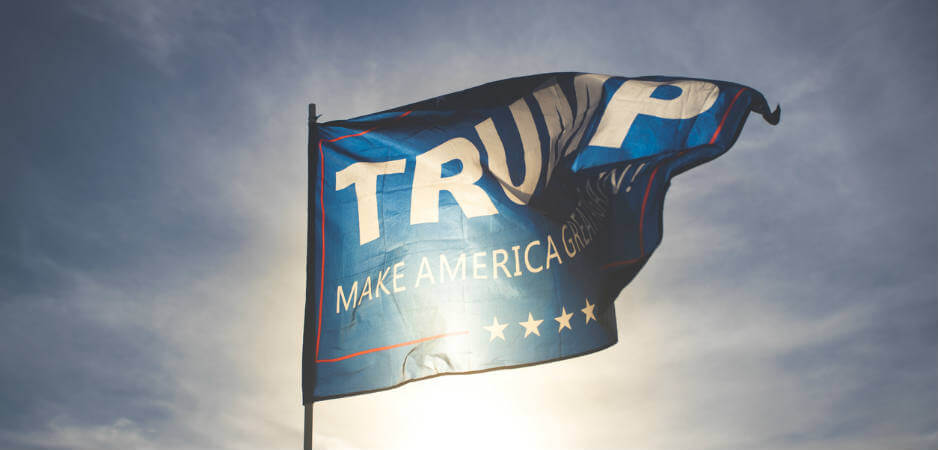In this edition of The Interview, Fair Observer talks to Sepideh Jodeyri, a poet who fled Iran for opposing the Islamic Republic.
US President Donald Trump came to power on a wave of anti-immigration, anti-Muslim populist rhetoric. Having aggressively targeted illegal immigrants coming into the country, with promises to build a physical wall to keep them out, the Trump team’s focus on the threat of Islamist terrorism was the rallying cry of his election campaign.
“Islam hates us” is a sentiment that the White House is trying to mask in legalese, but the administration’s policy proposals hardly cover up an underlying Islamophobia.
On January 27—Holocaust Memorial Day—Trump signed the first executive order that placed a temporary ban on all arrivals from seven Muslim-majority countries: Iran, Iraq, Libya, Syria, Sudan, Yemen and Somalia. What became known as the “Muslim Ban” provoked a mass outcry across the country, with federal courts overturning both its first and second versions on the grounds of religious discrimination.
In this edition of The Interview, Fair Observer talks to Sepideh Jodeyri, a poet and activist who was forced to escape persecution in her native Iran following a crackdown on the Green Movement after the 2009 presidential election. Having spent six years in exile in Italy and the Czech Republic, she arrived in America just weeks before Trump’s inauguration.
Fair Observer talks to Jodeyri about her reasons for leaving Iran, the importance of political and religious freedom and the uncertain, possibly dangerous, future.
Anna Pivovarchuk: You have just recently arrived in America, after having spent a years in exile in Europe. Could you tell us why you felt compelled to leave Iran?
Sepideh Jodeyri: It was not just me at the time who left Iran: A huge population left after 2009, when the semi-revolution happened—the Green Movement against the result of the presidential election. We felt that the election turned into a coup d’état and there was some cheating, because of which Mahmoud Ahmadinejad was elected again. So, we didn’t want him to be our president and people of Iran—millions of people—were in the streets protesting the result.
I was pregnant at the time, so I couldn’t demonstrate. But my husband and my father were at all the demonstrations. I was writing all the statements that I could from home, and many of my friends did the same. Some of those who were imprisoned as a result of this were my close friends. After I left Iran, a few months later two well-known poets from my generation were imprisoned, because they wrote poems celebrating the movement.
One of them, Seyyed Mehdi Mousavi, was then sentenced to nine years, just for his poems, and Fatemeh Ekhtesari was given 11-and-a-half years. Both of them were to receive 99 lashes each. And they were just poets, you know. We were shocked about this sentence. But then they escaped Iran after they were released on bail.
For me, it was a forced immigration: Because I supported the Green Movement I faced threats, my friends faced threats. Because of the literary prize that I founded in Iran—Iranian Women’s Poetry Prize—the authorities started to interrogate the sponsors and asked them, “Why are you cooperating Jodeyri? She wants to start a feminist movement with this prize!” So I thought they were going to come for me after that.
After my son was born, we had even more concerns. My husband was a writer and journalist and he worked for reformist newspapers—all of them were banned at the time. For a year-and-a-half after the election, both of us were unemployed. Nobody could guess what would come.
Because of that, we applied for ICORN fellowship for writers in danger, sponsored by PEN International. It took almost a long time, but the city of Chiusi in Tuscany decided to invite us as guest writers, so in February 2011 we moved to Italy for two years. After the fellowship ended, my husband found a job with Radio Free Europe (RFERL), in Prague, where we stayed for four years.
Then, because of my son’s autism and for him to be able to receive special education in English—which is the only language that he speaks—when we got our green cards [because RFERL is a US organization, employees are eligible to apply for a green card after two years—FO], we moved to the United States.
Pivovarchuk: So you chose America specifically because of your family circumstances, or were other factors in play?
Jodeyri: My main motivation was my son. Of course living in the US—were it not for President Trump—is easier for immigrants like us than living in Europe. Here we feel we are not immigrants, we feel that we are part of the community, of society. Because the US and Canada are the countries of immigrants. That’s very important. For example, Czech Republic is not a country of immigrants, Italy is not a country of immigrants. So because of that of course we feel better here.
But it wasn’t just because of us. My husband had to resign from his job with RFERL, and now we are working as freelance journalists and translators. Here we don’t have a permanent job. If my son didn’t have autism, we maybe would have waited to get a permanent position before coming to the US. But my son’s situation was very urgent for us: He is seven years old now, and in Prague there was no possibility for him to make progress. So even if we lost our jobs, it was still better for us to be in the US.
Pivovarchuk: You brought up Trump: Are you worried about this new anti-Muslim, anti-Iran sentiment that is coming from the Trump administration? Is that something that scares you?
Jodeyri: Of course, of course. I am not a Muslim—I do not believe in Islam. But because my hair is black and because I come from the Middle East, they consider all of us as Muslims. Of course, Muslim immigrants should not be considered as a danger to anybody. A woman who is wearing a scarf because she believes in it is not a threat to anybody, doesn’t mean any harm to anybody. And because of her beliefs she’ll be banned, or some racist people might attack her.
As a feminist, I am against the veil. Because we fought to not have to cover our hair—many women were protesting in Iran. But even if I am against the veil, I support those ladies who choose to wear it because of their beliefs. They are not harmful to anybody—they are not terrorists.
It’s crazy that we target everyone who comes from Muslim countries as terrorists. Of course they are not. The terrorists are a minority, and we shouldn’t make the majority of Muslims victims of that minority. I am not a politician and don’t know how the US, or Europe or any other country in the world can fight terrorists. But this is not the right way. Terrorism doesn’t come from some specific nations—terrorism is a dangerous thought that can happen in any nation, any country.
You remember the Norwegian terrorist who committed mass murder in 2011 [Anders Behring Breivik, a far-right extremist, killed 77 people, most of them from the Labor Party’s youth wing—FO]. But nobody considers the entire Norwegian nation as terrorists because of that incident.
So, it’s not the right way that Mr. Trump is choosing now. Many of the Iranian people who immigrated to or have sought asylum from the US are in opposition to the Iranian government. So by doing this, they turn against the opposition—which is great for the Islamic Republic. The Trump administration are fighting the ordinary people—not the government of Iran, which might be Mr. Trump’s target.
Pivovarchuk: So what was your initial reaction to the Muslim ban?
Jodeyri: My first reaction? Of course, on my Twitter and Facebook I wrote many posts against that damn rule, but I couldn’t do anything else. What could I do? I think he might want to [isolate] us from other people. I don’t know what will happen to us. We have many concerns as we don’t know what Mr. Trump wants to do. It is still surprising and shocking for us. If Trump’s goal is to weaken the government of the Islamic Republic of Iran—he’s actually making them stronger by turning against the people of Iran and the opposition.
Pivovarchuk: Is the public mood in Iran turning against America now?
Jodeyri: What you see in the media—the Iranian government media—is not true. The people of Iran are not against America: They love American people. Many people in Iran would like to live in America. The government pays some people to demonstrate against America, and that is what you see in the media.
We have some leftists who are against, for example, capitalism—but not the US itself. People in Iran hate the US? That’s not true at all. But this new rule will of course anger people as it is a rule against the people, not the rulers of Iran.
Pivovarchuk: Are you scared that you might have to go back to Iran? Is that a fear?
Jodeyri: I don’t know, really… I cannot predict anything for now. But if it happens, at the very least we will be imprisoned. If they deport us back to Iran—my husband and I and many others—what we will face is imprisonment, at least. I am sure that we will be tortured, some of us will even be executed, because the Iranian government will consider us—the opposition in exile—as Western spies. And the punishment for espionage is death.
I cannot judge the situations of other people, but I will tell you about myself: Because of the book I translated and published in Paris two years ago—Julie Maroh’s Blue is the Warmest Color—some radical groups started attacking me, on social and official Iranian media. I was involved in human rights activities—with minorities, with the LGBT community—so if I come back to Iran, or anyone who is in a similar situation to me, they will condemn us as Western spies. Because they think if you promote and support the LGBT or other minorities, it is a Western thought—it’s not a human thought—so you must be a spy.
Pivovarchuk: So there hasn’t been any improvement in the human rights situation in Iran?
Jodeyri: No, not at all. If you look at Amnesty [International] reports, they always list executions. And the number of executions in Iran increased since Mr. Rouhani became president. At the beginning, I thought Mr. Rouhani will decrease the pressure on political activists and improve the situation of human rights in Iran, but it didn’t happen. The only thing that changed was the relationship between Iran and foreign countries—now they are making some deals. Foreign affairs improved, but the internal situation did not. It is even more severe than before.
Pivovarchuk: Obviously you are worried about the future, so do you have a plan B?
Jodeyri: Actually, I am really happy that we are living during the period of some good people—that they are leaders of some countries, like, for example, Canada, like Germany… I do respect Mrs. Merkel so much because she is supporting refugees—she is a true human being. I respect her and I am proud of her, as a woman I am proud of her, as a feminist.
And of course I am proud of Mr. Trudeau—he believes in equality, so he announced that if you face any problem in the US, our arms are open to you. I don’t know what will happen in the future, but yes, the plan B for refugees and immigrants from those nations that are banned by Mr. Trump can be some countries such as Canada or Germany. I mean, I hope so.
The views expressed in this article are the author’s own and do not necessarily reflect Fair Observer’s editorial policy.
Photo Credit: LPETTET
Support Fair Observer
We rely on your support for our independence, diversity and quality.
For more than 10 years, Fair Observer has been free, fair and independent. No billionaire owns us, no advertisers control us. We are a reader-supported nonprofit. Unlike many other publications, we keep our content free for readers regardless of where they live or whether they can afford to pay. We have no paywalls and no ads.
In the post-truth era of fake news, echo chambers and filter bubbles, we publish a plurality of perspectives from around the world. Anyone can publish with us, but everyone goes through a rigorous editorial process. So, you get fact-checked, well-reasoned content instead of noise.
We publish 2,500+ voices from 90+ countries. We also conduct education and training programs
on subjects ranging from digital media and journalism to writing and critical thinking. This
doesn’t come cheap. Servers, editors, trainers and web developers cost
money.
Please consider supporting us on a regular basis as a recurring donor or a
sustaining member.
Will you support FO’s journalism?
We rely on your support for our independence, diversity and quality.







